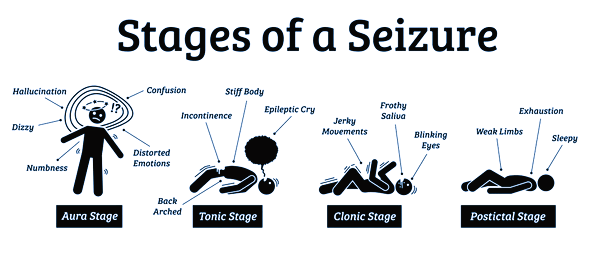Epilepsy and Seizures: Causes, Symptoms, and Treatment
Discover the causes, symptoms, and treatment of epilepsy and seizures in our informative blog. Gain insights into managing this condition and find support for yourself or a loved one.


Epilepsy is a neurological disorder characterized by recurrent seizures. Seizures occur due to abnormal electrical activity in the brain, resulting in temporary disruptions in normal brain function. This condition affects people of all ages, with approximately 50 million individuals worldwide living with epilepsy.
Causes of Epilepsy
Epilepsy can have various causes, including:
Genetic factors: Certain genetic mutations or inherited traits can increase the risk of developing epilepsy.
Brain conditions: Brain tumors, strokes, infections, or traumatic brain injuries can lead to epilepsy.
Developmental disorders: Conditions such as autism or neurofibromatosis can be associated with epilepsy.
Infections: Infections like meningitis or encephalitis can cause epilepsy.
Prenatal factors: Exposure to drugs, alcohol, or infections during pregnancy can increase the risk of epilepsy in the child.
Symptoms of Epilepsy
The symptoms of epilepsy can vary depending on the type of seizure and the area of the brain affected. Common symptoms include:
Uncontrolled jerking movements of the limbs
Temporary confusion or loss of awareness
Staring spells
Repetitive movements, such as lip smacking or blinking
Sensations of tingling or numbness
Unexplained emotions or behaviors
It is important to note that not all seizures indicate epilepsy. A single seizure does not necessarily mean a person has epilepsy. Epilepsy is diagnosed when a person experiences recurrent seizures over time.
Treatment for Epilepsy
While epilepsy cannot be cured, it can be managed effectively with the right treatment. The primary goal of epilepsy treatment is to control seizures and improve the individual's quality of life. Treatment options include:
Medication: Anti-seizure medications are the most common form of treatment. The type and dosage of medication prescribed will depend on the individual's specific needs.
Ketogenic diet: This high-fat, low-carbohydrate diet has shown to be effective in reducing seizures, particularly in children.
Vagus nerve stimulation: A device is implanted in the chest to deliver electrical impulses to the brain, helping to reduce seizure frequency.
Epilepsy surgery: In some cases, surgery may be an option to remove or alter the area of the brain causing seizures.
It is crucial for individuals with epilepsy to work closely with their healthcare team to find the most suitable treatment plan. Regular medical check-ups, adherence to medication, and lifestyle adjustments can significantly contribute to managing epilepsy effectively.
In conclusion, epilepsy is a neurological disorder characterized by recurrent seizures. It can have various causes, including genetic factors, brain conditions, developmental disorders, infections, and prenatal factors. The symptoms of epilepsy vary depending on the type of seizure and can include uncontrolled jerking movements, confusion, staring spells, and repetitive movements. While epilepsy cannot be cured, it can be effectively managed with medications, dietary interventions, nerve stimulation, and surgery. With proper treatment and support, individuals with epilepsy can lead fulfilling lives.
